UK Legal System: Classifications, Sources, and Impact on Organizations
VerifiedAdded on 2023/06/09
|10
|2200
|221
Essay
AI Summary
This essay provides a comprehensive overview of the UK legal system, beginning with a clear definition of law within the UK context and delving into the two main classifications: public and private law. It identifies the three distinct legal systems operating within the UK (England and Wales, Scotland, and Northern Ireland) and explores the hierarchy and principal sources of law, including legislation, case law, and European Union law (and its evolving impact post-Brexit). The essay further examines the impact of these laws on multilingual organizations, highlighting the importance of linguistic diversity in international business. Finally, it uses contract law as a specific example to illustrate the UK law-making process and its direct impact on commercial organizations, emphasizing the role of contract law in safeguarding business interests and ensuring legal compliance.

1 exam
Paraphrase This Document
Need a fresh take? Get an instant paraphrase of this document with our AI Paraphraser
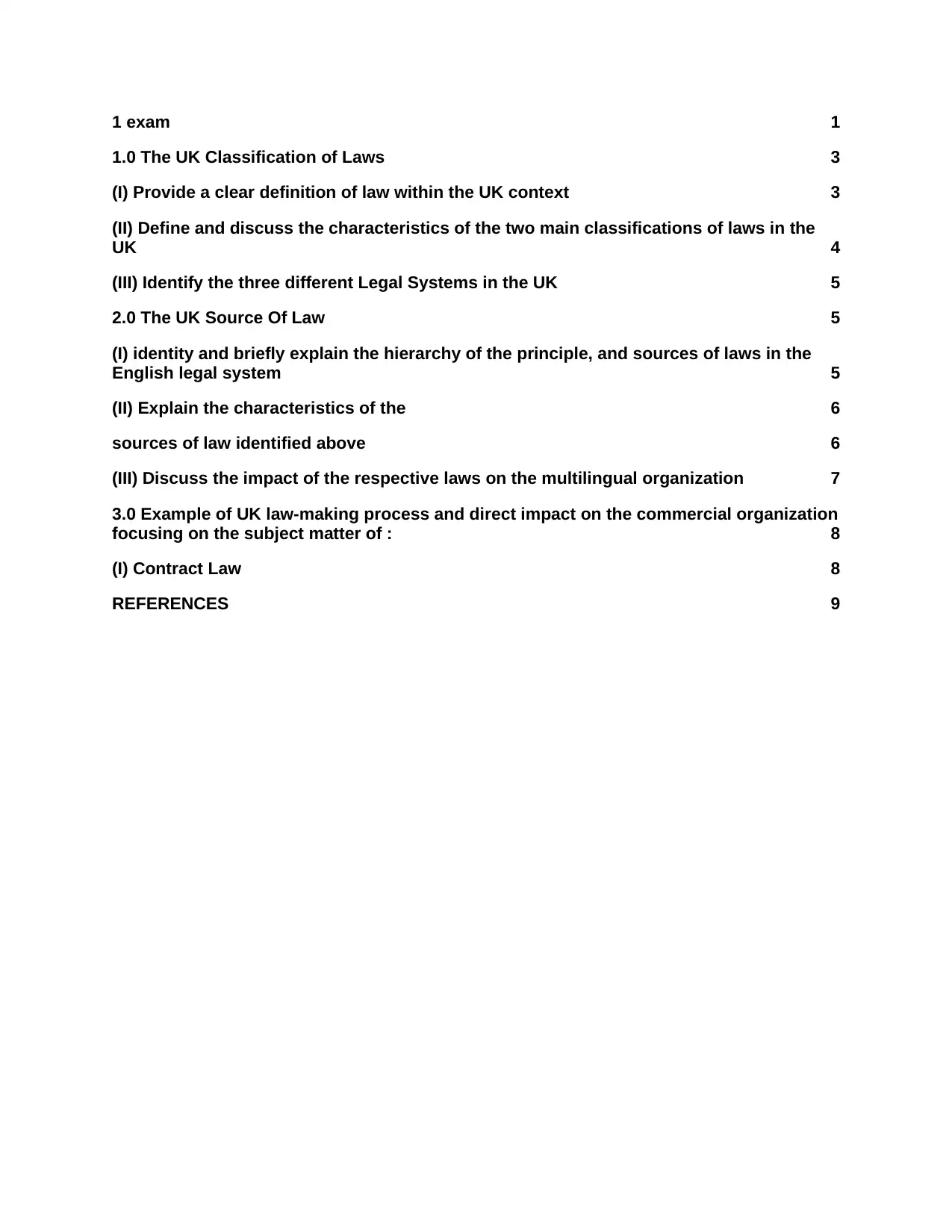
1 exam 1
1.0 The UK Classification of Laws 3
(I) Provide a clear definition of law within the UK context 3
(II) Define and discuss the characteristics of the two main classifications of laws in the
UK 4
(III) Identify the three different Legal Systems in the UK 5
2.0 The UK Source Of Law 5
(I) identity and briefly explain the hierarchy of the principle, and sources of laws in the
English legal system 5
(II) Explain the characteristics of the 6
sources of law identified above 6
(III) Discuss the impact of the respective laws on the multilingual organization 7
3.0 Example of UK law-making process and direct impact on the commercial organization
focusing on the subject matter of : 8
(I) Contract Law 8
REFERENCES 9
1.0 The UK Classification of Laws 3
(I) Provide a clear definition of law within the UK context 3
(II) Define and discuss the characteristics of the two main classifications of laws in the
UK 4
(III) Identify the three different Legal Systems in the UK 5
2.0 The UK Source Of Law 5
(I) identity and briefly explain the hierarchy of the principle, and sources of laws in the
English legal system 5
(II) Explain the characteristics of the 6
sources of law identified above 6
(III) Discuss the impact of the respective laws on the multilingual organization 7
3.0 Example of UK law-making process and direct impact on the commercial organization
focusing on the subject matter of : 8
(I) Contract Law 8
REFERENCES 9
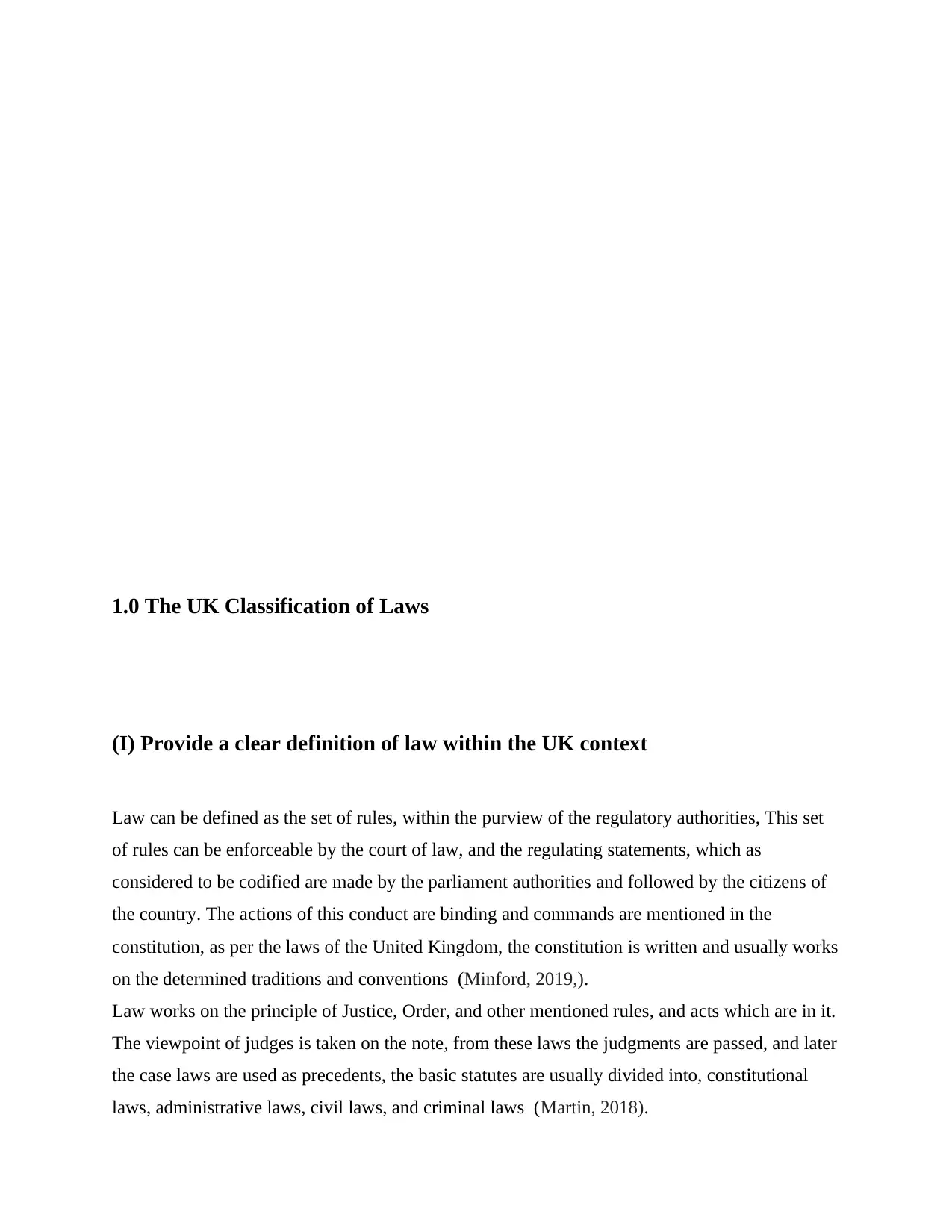
1.0 The UK Classification of Laws
(I) Provide a clear definition of law within the UK context
Law can be defined as the set of rules, within the purview of the regulatory authorities, This set
of rules can be enforceable by the court of law, and the regulating statements, which as
considered to be codified are made by the parliament authorities and followed by the citizens of
the country. The actions of this conduct are binding and commands are mentioned in the
constitution, as per the laws of the United Kingdom, the constitution is written and usually works
on the determined traditions and conventions (Minford, 2019,).
Law works on the principle of Justice, Order, and other mentioned rules, and acts which are in it.
The viewpoint of judges is taken on the note, from these laws the judgments are passed, and later
the case laws are used as precedents, the basic statutes are usually divided into, constitutional
laws, administrative laws, civil laws, and criminal laws (Martin, 2018).
(I) Provide a clear definition of law within the UK context
Law can be defined as the set of rules, within the purview of the regulatory authorities, This set
of rules can be enforceable by the court of law, and the regulating statements, which as
considered to be codified are made by the parliament authorities and followed by the citizens of
the country. The actions of this conduct are binding and commands are mentioned in the
constitution, as per the laws of the United Kingdom, the constitution is written and usually works
on the determined traditions and conventions (Minford, 2019,).
Law works on the principle of Justice, Order, and other mentioned rules, and acts which are in it.
The viewpoint of judges is taken on the note, from these laws the judgments are passed, and later
the case laws are used as precedents, the basic statutes are usually divided into, constitutional
laws, administrative laws, civil laws, and criminal laws (Martin, 2018).
⊘ This is a preview!⊘
Do you want full access?
Subscribe today to unlock all pages.

Trusted by 1+ million students worldwide
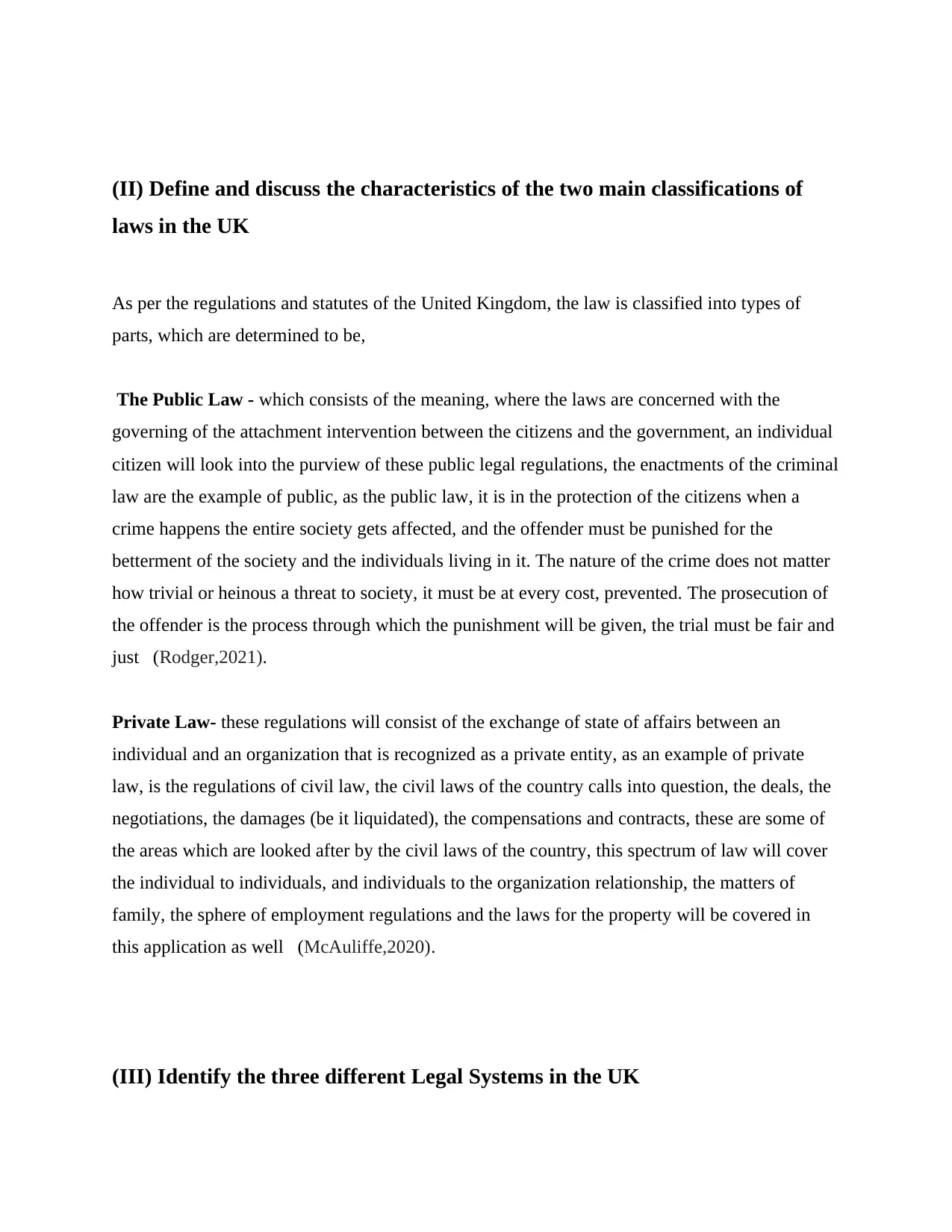
(II) Define and discuss the characteristics of the two main classifications of
laws in the UK
As per the regulations and statutes of the United Kingdom, the law is classified into types of
parts, which are determined to be,
The Public Law - which consists of the meaning, where the laws are concerned with the
governing of the attachment intervention between the citizens and the government, an individual
citizen will look into the purview of these public legal regulations, the enactments of the criminal
law are the example of public, as the public law, it is in the protection of the citizens when a
crime happens the entire society gets affected, and the offender must be punished for the
betterment of the society and the individuals living in it. The nature of the crime does not matter
how trivial or heinous a threat to society, it must be at every cost, prevented. The prosecution of
the offender is the process through which the punishment will be given, the trial must be fair and
just (Rodger,2021).
Private Law- these regulations will consist of the exchange of state of affairs between an
individual and an organization that is recognized as a private entity, as an example of private
law, is the regulations of civil law, the civil laws of the country calls into question, the deals, the
negotiations, the damages (be it liquidated), the compensations and contracts, these are some of
the areas which are looked after by the civil laws of the country, this spectrum of law will cover
the individual to individuals, and individuals to the organization relationship, the matters of
family, the sphere of employment regulations and the laws for the property will be covered in
this application as well (McAuliffe,2020).
(III) Identify the three different Legal Systems in the UK
laws in the UK
As per the regulations and statutes of the United Kingdom, the law is classified into types of
parts, which are determined to be,
The Public Law - which consists of the meaning, where the laws are concerned with the
governing of the attachment intervention between the citizens and the government, an individual
citizen will look into the purview of these public legal regulations, the enactments of the criminal
law are the example of public, as the public law, it is in the protection of the citizens when a
crime happens the entire society gets affected, and the offender must be punished for the
betterment of the society and the individuals living in it. The nature of the crime does not matter
how trivial or heinous a threat to society, it must be at every cost, prevented. The prosecution of
the offender is the process through which the punishment will be given, the trial must be fair and
just (Rodger,2021).
Private Law- these regulations will consist of the exchange of state of affairs between an
individual and an organization that is recognized as a private entity, as an example of private
law, is the regulations of civil law, the civil laws of the country calls into question, the deals, the
negotiations, the damages (be it liquidated), the compensations and contracts, these are some of
the areas which are looked after by the civil laws of the country, this spectrum of law will cover
the individual to individuals, and individuals to the organization relationship, the matters of
family, the sphere of employment regulations and the laws for the property will be covered in
this application as well (McAuliffe,2020).
(III) Identify the three different Legal Systems in the UK
Paraphrase This Document
Need a fresh take? Get an instant paraphrase of this document with our AI Paraphraser

The legal structure of the United Kingdom is scattered into three different parts, the country
codes revolve around different legal systems, which vary from, England and Wales, Scotland,
and Northern Ireland. The elevating legal system does go a long way, from its origination in
history, the relevance of laws in Britain takes a virtue spot mainly in England and Wales, as the
constitution of the UK is unwritten but the well-versed regulations take their application from the
sources. There are courts and tribunals in the country working fairly, within keeping reflection of
laws, the structure of the legal system is defined in the hierarchy of courts, The Supreme Court,
The Court of Appeal, and the High court, and later comes the tribunals (Twigg-Flesner, 2022).
2.0 The UK Source Of Law
(I) identity and briefly explain the hierarchy of the principle, and sources of
laws in the English legal system
The hierarchy of the court system of the English legal system, the structure defined on various
levels such as the
● The Supreme Court, formerly which was known as the house of lords, is considered the
height of the level of the English legal system, the paramount court, the working includes
the matters from the court of appeal, usually, the bench goes up to 5 judges, and
maximum to the level of 9 judges bench (Dowlatkhah, 2018).
● The Court of Appeal, this court of laws, consists of two divisions, of which one is the
Civil Division, which hears the matters related to the civil law and the second is the
Criminal Division, which hears the matters related to the criminal laws.
codes revolve around different legal systems, which vary from, England and Wales, Scotland,
and Northern Ireland. The elevating legal system does go a long way, from its origination in
history, the relevance of laws in Britain takes a virtue spot mainly in England and Wales, as the
constitution of the UK is unwritten but the well-versed regulations take their application from the
sources. There are courts and tribunals in the country working fairly, within keeping reflection of
laws, the structure of the legal system is defined in the hierarchy of courts, The Supreme Court,
The Court of Appeal, and the High court, and later comes the tribunals (Twigg-Flesner, 2022).
2.0 The UK Source Of Law
(I) identity and briefly explain the hierarchy of the principle, and sources of
laws in the English legal system
The hierarchy of the court system of the English legal system, the structure defined on various
levels such as the
● The Supreme Court, formerly which was known as the house of lords, is considered the
height of the level of the English legal system, the paramount court, the working includes
the matters from the court of appeal, usually, the bench goes up to 5 judges, and
maximum to the level of 9 judges bench (Dowlatkhah, 2018).
● The Court of Appeal, this court of laws, consists of two divisions, of which one is the
Civil Division, which hears the matters related to the civil law and the second is the
Criminal Division, which hears the matters related to the criminal laws.
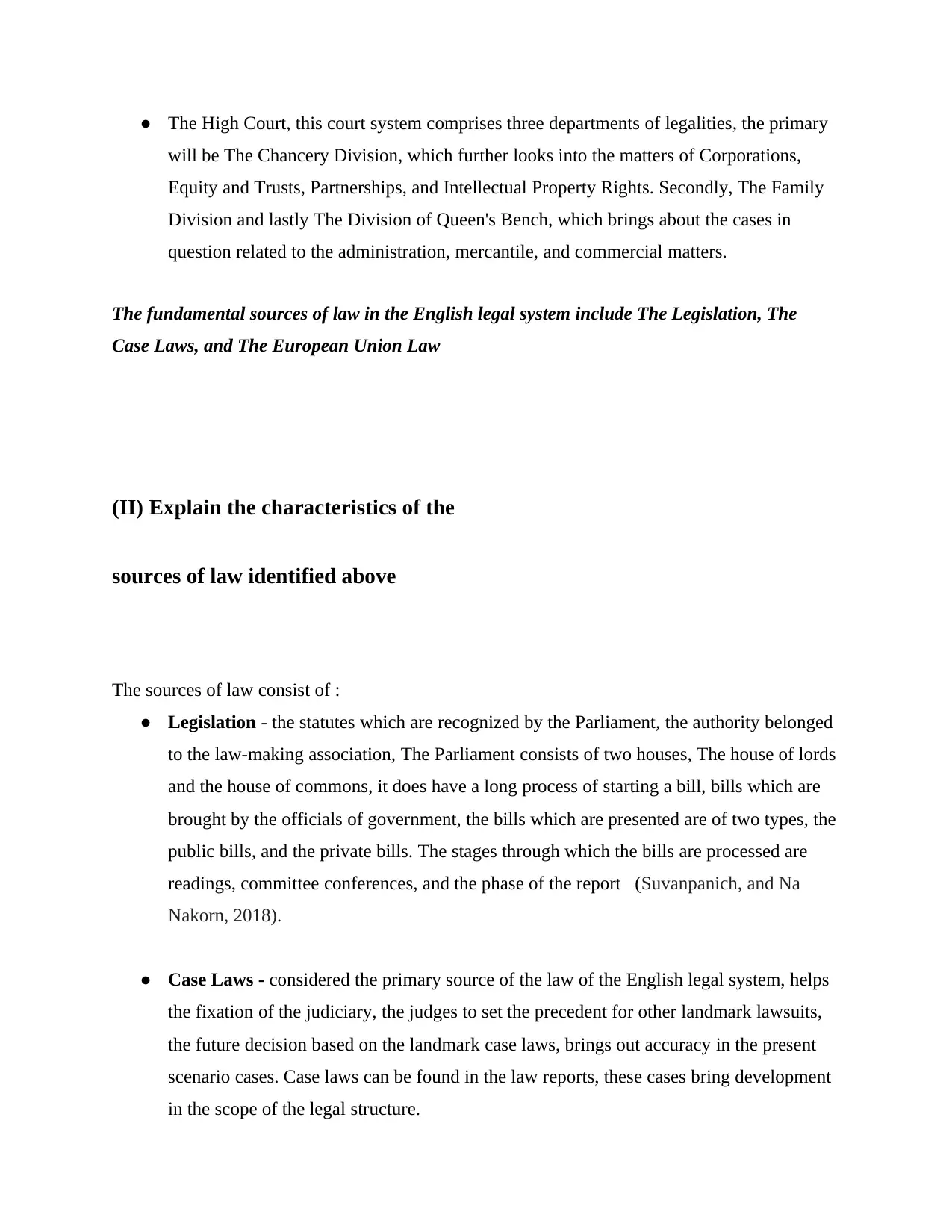
● The High Court, this court system comprises three departments of legalities, the primary
will be The Chancery Division, which further looks into the matters of Corporations,
Equity and Trusts, Partnerships, and Intellectual Property Rights. Secondly, The Family
Division and lastly The Division of Queen's Bench, which brings about the cases in
question related to the administration, mercantile, and commercial matters.
The fundamental sources of law in the English legal system include The Legislation, The
Case Laws, and The European Union Law
(II) Explain the characteristics of the
sources of law identified above
The sources of law consist of :
● Legislation - the statutes which are recognized by the Parliament, the authority belonged
to the law-making association, The Parliament consists of two houses, The house of lords
and the house of commons, it does have a long process of starting a bill, bills which are
brought by the officials of government, the bills which are presented are of two types, the
public bills, and the private bills. The stages through which the bills are processed are
readings, committee conferences, and the phase of the report (Suvanpanich, and Na
Nakorn, 2018).
● Case Laws - considered the primary source of the law of the English legal system, helps
the fixation of the judiciary, the judges to set the precedent for other landmark lawsuits,
the future decision based on the landmark case laws, brings out accuracy in the present
scenario cases. Case laws can be found in the law reports, these cases bring development
in the scope of the legal structure.
will be The Chancery Division, which further looks into the matters of Corporations,
Equity and Trusts, Partnerships, and Intellectual Property Rights. Secondly, The Family
Division and lastly The Division of Queen's Bench, which brings about the cases in
question related to the administration, mercantile, and commercial matters.
The fundamental sources of law in the English legal system include The Legislation, The
Case Laws, and The European Union Law
(II) Explain the characteristics of the
sources of law identified above
The sources of law consist of :
● Legislation - the statutes which are recognized by the Parliament, the authority belonged
to the law-making association, The Parliament consists of two houses, The house of lords
and the house of commons, it does have a long process of starting a bill, bills which are
brought by the officials of government, the bills which are presented are of two types, the
public bills, and the private bills. The stages through which the bills are processed are
readings, committee conferences, and the phase of the report (Suvanpanich, and Na
Nakorn, 2018).
● Case Laws - considered the primary source of the law of the English legal system, helps
the fixation of the judiciary, the judges to set the precedent for other landmark lawsuits,
the future decision based on the landmark case laws, brings out accuracy in the present
scenario cases. Case laws can be found in the law reports, these cases bring development
in the scope of the legal structure.
⊘ This is a preview!⊘
Do you want full access?
Subscribe today to unlock all pages.

Trusted by 1+ million students worldwide
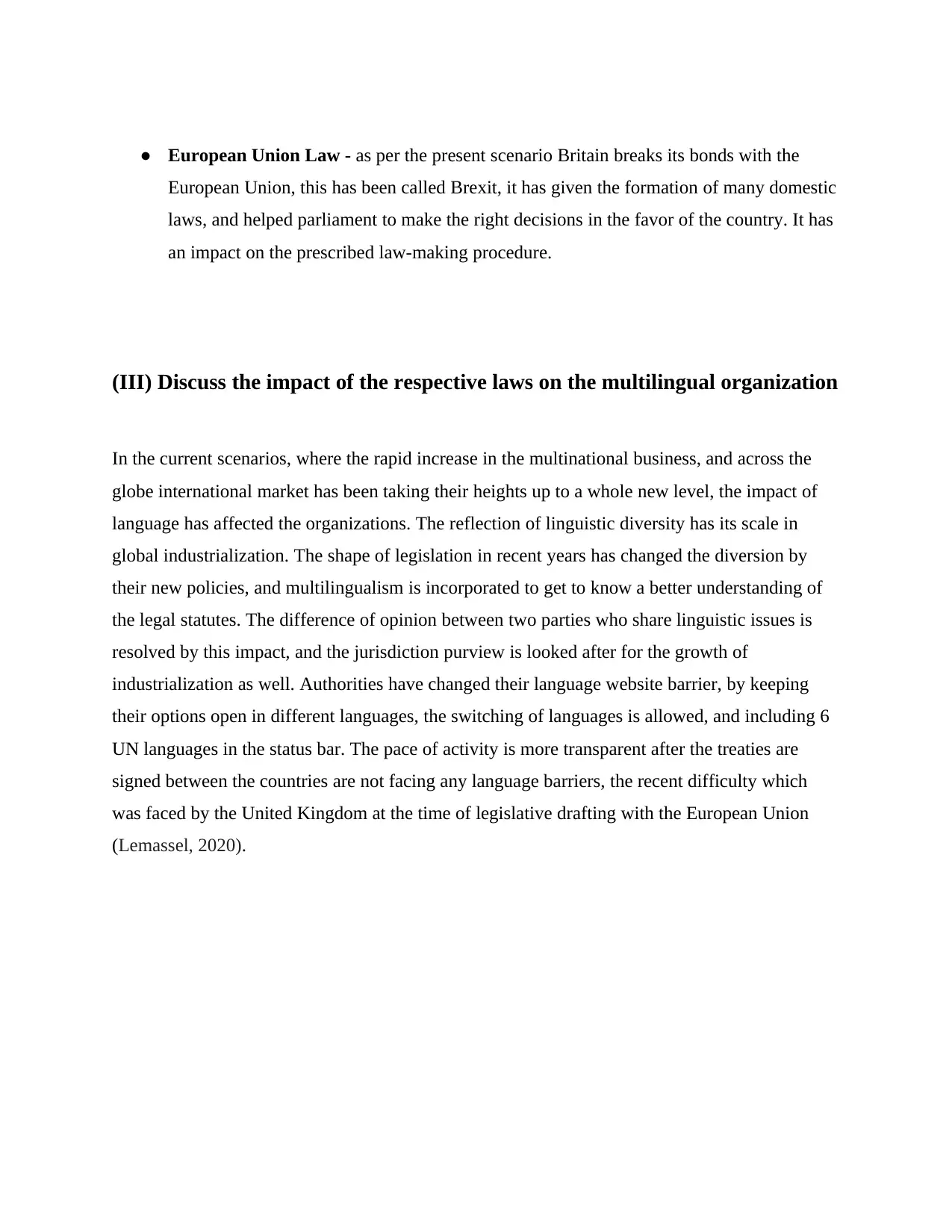
● European Union Law - as per the present scenario Britain breaks its bonds with the
European Union, this has been called Brexit, it has given the formation of many domestic
laws, and helped parliament to make the right decisions in the favor of the country. It has
an impact on the prescribed law-making procedure.
(III) Discuss the impact of the respective laws on the multilingual organization
In the current scenarios, where the rapid increase in the multinational business, and across the
globe international market has been taking their heights up to a whole new level, the impact of
language has affected the organizations. The reflection of linguistic diversity has its scale in
global industrialization. The shape of legislation in recent years has changed the diversion by
their new policies, and multilingualism is incorporated to get to know a better understanding of
the legal statutes. The difference of opinion between two parties who share linguistic issues is
resolved by this impact, and the jurisdiction purview is looked after for the growth of
industrialization as well. Authorities have changed their language website barrier, by keeping
their options open in different languages, the switching of languages is allowed, and including 6
UN languages in the status bar. The pace of activity is more transparent after the treaties are
signed between the countries are not facing any language barriers, the recent difficulty which
was faced by the United Kingdom at the time of legislative drafting with the European Union
(Lemassel, 2020).
European Union, this has been called Brexit, it has given the formation of many domestic
laws, and helped parliament to make the right decisions in the favor of the country. It has
an impact on the prescribed law-making procedure.
(III) Discuss the impact of the respective laws on the multilingual organization
In the current scenarios, where the rapid increase in the multinational business, and across the
globe international market has been taking their heights up to a whole new level, the impact of
language has affected the organizations. The reflection of linguistic diversity has its scale in
global industrialization. The shape of legislation in recent years has changed the diversion by
their new policies, and multilingualism is incorporated to get to know a better understanding of
the legal statutes. The difference of opinion between two parties who share linguistic issues is
resolved by this impact, and the jurisdiction purview is looked after for the growth of
industrialization as well. Authorities have changed their language website barrier, by keeping
their options open in different languages, the switching of languages is allowed, and including 6
UN languages in the status bar. The pace of activity is more transparent after the treaties are
signed between the countries are not facing any language barriers, the recent difficulty which
was faced by the United Kingdom at the time of legislative drafting with the European Union
(Lemassel, 2020).
Paraphrase This Document
Need a fresh take? Get an instant paraphrase of this document with our AI Paraphraser
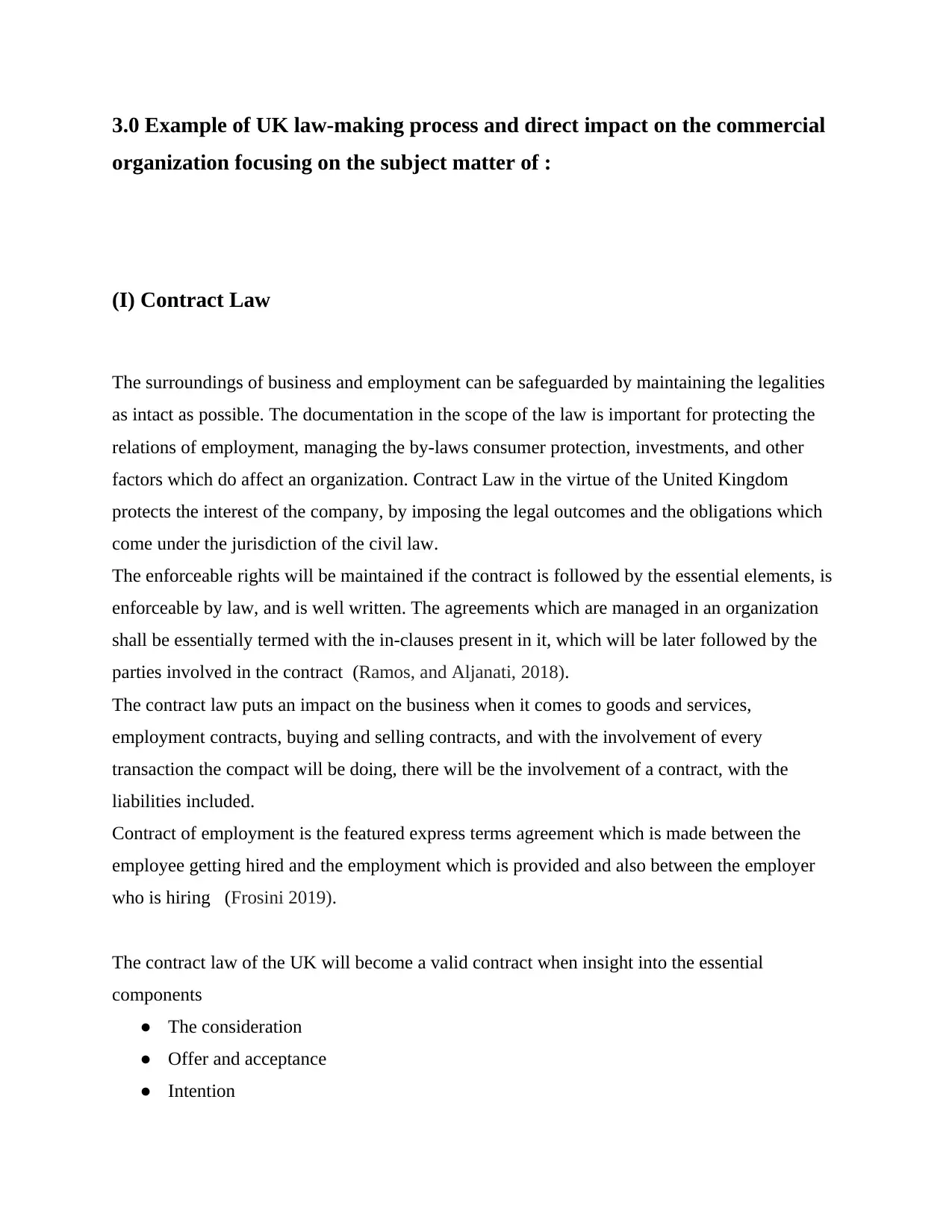
3.0 Example of UK law-making process and direct impact on the commercial
organization focusing on the subject matter of :
(I) Contract Law
The surroundings of business and employment can be safeguarded by maintaining the legalities
as intact as possible. The documentation in the scope of the law is important for protecting the
relations of employment, managing the by-laws consumer protection, investments, and other
factors which do affect an organization. Contract Law in the virtue of the United Kingdom
protects the interest of the company, by imposing the legal outcomes and the obligations which
come under the jurisdiction of the civil law.
The enforceable rights will be maintained if the contract is followed by the essential elements, is
enforceable by law, and is well written. The agreements which are managed in an organization
shall be essentially termed with the in-clauses present in it, which will be later followed by the
parties involved in the contract (Ramos, and Aljanati, 2018).
The contract law puts an impact on the business when it comes to goods and services,
employment contracts, buying and selling contracts, and with the involvement of every
transaction the compact will be doing, there will be the involvement of a contract, with the
liabilities included.
Contract of employment is the featured express terms agreement which is made between the
employee getting hired and the employment which is provided and also between the employer
who is hiring (Frosini 2019).
The contract law of the UK will become a valid contract when insight into the essential
components
● The consideration
● Offer and acceptance
● Intention
organization focusing on the subject matter of :
(I) Contract Law
The surroundings of business and employment can be safeguarded by maintaining the legalities
as intact as possible. The documentation in the scope of the law is important for protecting the
relations of employment, managing the by-laws consumer protection, investments, and other
factors which do affect an organization. Contract Law in the virtue of the United Kingdom
protects the interest of the company, by imposing the legal outcomes and the obligations which
come under the jurisdiction of the civil law.
The enforceable rights will be maintained if the contract is followed by the essential elements, is
enforceable by law, and is well written. The agreements which are managed in an organization
shall be essentially termed with the in-clauses present in it, which will be later followed by the
parties involved in the contract (Ramos, and Aljanati, 2018).
The contract law puts an impact on the business when it comes to goods and services,
employment contracts, buying and selling contracts, and with the involvement of every
transaction the compact will be doing, there will be the involvement of a contract, with the
liabilities included.
Contract of employment is the featured express terms agreement which is made between the
employee getting hired and the employment which is provided and also between the employer
who is hiring (Frosini 2019).
The contract law of the UK will become a valid contract when insight into the essential
components
● The consideration
● Offer and acceptance
● Intention
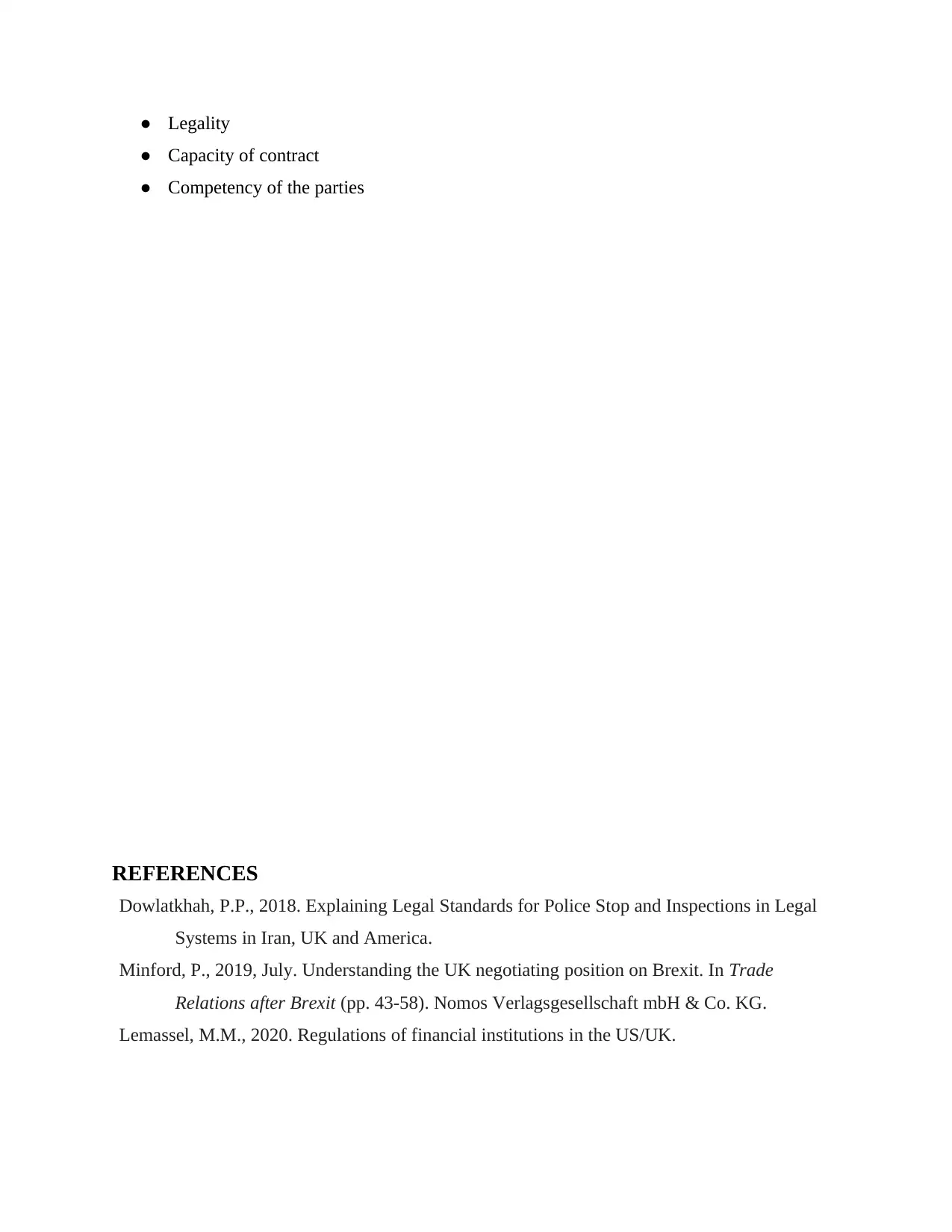
● Legality
● Capacity of contract
● Competency of the parties
REFERENCES
Dowlatkhah, P.P., 2018. Explaining Legal Standards for Police Stop and Inspections in Legal
Systems in Iran, UK and America.
Minford, P., 2019, July. Understanding the UK negotiating position on Brexit. In Trade
Relations after Brexit (pp. 43-58). Nomos Verlagsgesellschaft mbH & Co. KG.
Lemassel, M.M., 2020. Regulations of financial institutions in the US/UK.
● Capacity of contract
● Competency of the parties
REFERENCES
Dowlatkhah, P.P., 2018. Explaining Legal Standards for Police Stop and Inspections in Legal
Systems in Iran, UK and America.
Minford, P., 2019, July. Understanding the UK negotiating position on Brexit. In Trade
Relations after Brexit (pp. 43-58). Nomos Verlagsgesellschaft mbH & Co. KG.
Lemassel, M.M., 2020. Regulations of financial institutions in the US/UK.
⊘ This is a preview!⊘
Do you want full access?
Subscribe today to unlock all pages.

Trusted by 1+ million students worldwide
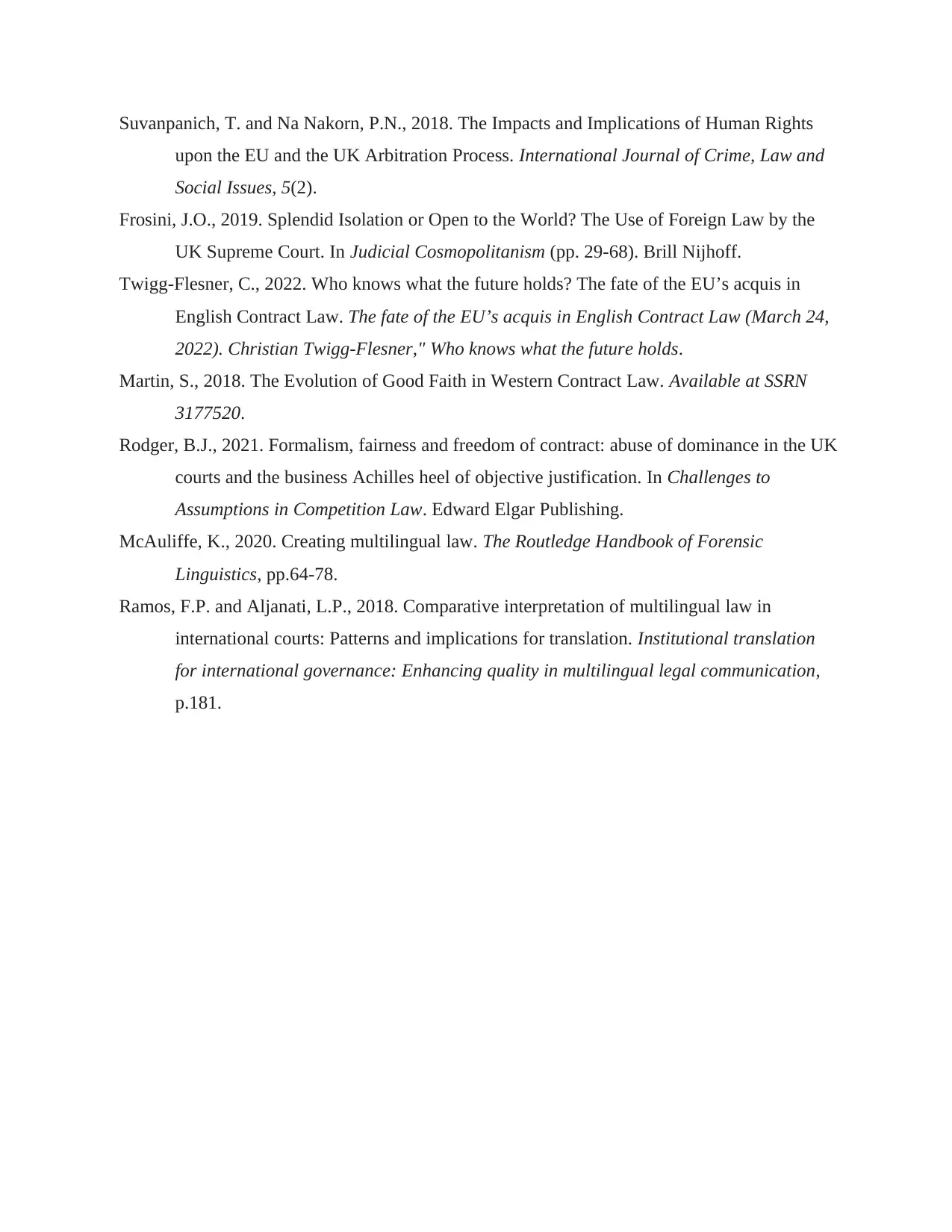
Suvanpanich, T. and Na Nakorn, P.N., 2018. The Impacts and Implications of Human Rights
upon the EU and the UK Arbitration Process. International Journal of Crime, Law and
Social Issues, 5(2).
Frosini, J.O., 2019. Splendid Isolation or Open to the World? The Use of Foreign Law by the
UK Supreme Court. In Judicial Cosmopolitanism (pp. 29-68). Brill Nijhoff.
Twigg-Flesner, C., 2022. Who knows what the future holds? The fate of the EU’s acquis in
English Contract Law. The fate of the EU’s acquis in English Contract Law (March 24,
2022). Christian Twigg-Flesner," Who knows what the future holds.
Martin, S., 2018. The Evolution of Good Faith in Western Contract Law. Available at SSRN
3177520.
Rodger, B.J., 2021. Formalism, fairness and freedom of contract: abuse of dominance in the UK
courts and the business Achilles heel of objective justification. In Challenges to
Assumptions in Competition Law. Edward Elgar Publishing.
McAuliffe, K., 2020. Creating multilingual law. The Routledge Handbook of Forensic
Linguistics, pp.64-78.
Ramos, F.P. and Aljanati, L.P., 2018. Comparative interpretation of multilingual law in
international courts: Patterns and implications for translation. Institutional translation
for international governance: Enhancing quality in multilingual legal communication,
p.181.
upon the EU and the UK Arbitration Process. International Journal of Crime, Law and
Social Issues, 5(2).
Frosini, J.O., 2019. Splendid Isolation or Open to the World? The Use of Foreign Law by the
UK Supreme Court. In Judicial Cosmopolitanism (pp. 29-68). Brill Nijhoff.
Twigg-Flesner, C., 2022. Who knows what the future holds? The fate of the EU’s acquis in
English Contract Law. The fate of the EU’s acquis in English Contract Law (March 24,
2022). Christian Twigg-Flesner," Who knows what the future holds.
Martin, S., 2018. The Evolution of Good Faith in Western Contract Law. Available at SSRN
3177520.
Rodger, B.J., 2021. Formalism, fairness and freedom of contract: abuse of dominance in the UK
courts and the business Achilles heel of objective justification. In Challenges to
Assumptions in Competition Law. Edward Elgar Publishing.
McAuliffe, K., 2020. Creating multilingual law. The Routledge Handbook of Forensic
Linguistics, pp.64-78.
Ramos, F.P. and Aljanati, L.P., 2018. Comparative interpretation of multilingual law in
international courts: Patterns and implications for translation. Institutional translation
for international governance: Enhancing quality in multilingual legal communication,
p.181.
1 out of 10
Related Documents
Your All-in-One AI-Powered Toolkit for Academic Success.
+13062052269
info@desklib.com
Available 24*7 on WhatsApp / Email
![[object Object]](/_next/static/media/star-bottom.7253800d.svg)
Unlock your academic potential
Copyright © 2020–2026 A2Z Services. All Rights Reserved. Developed and managed by ZUCOL.




